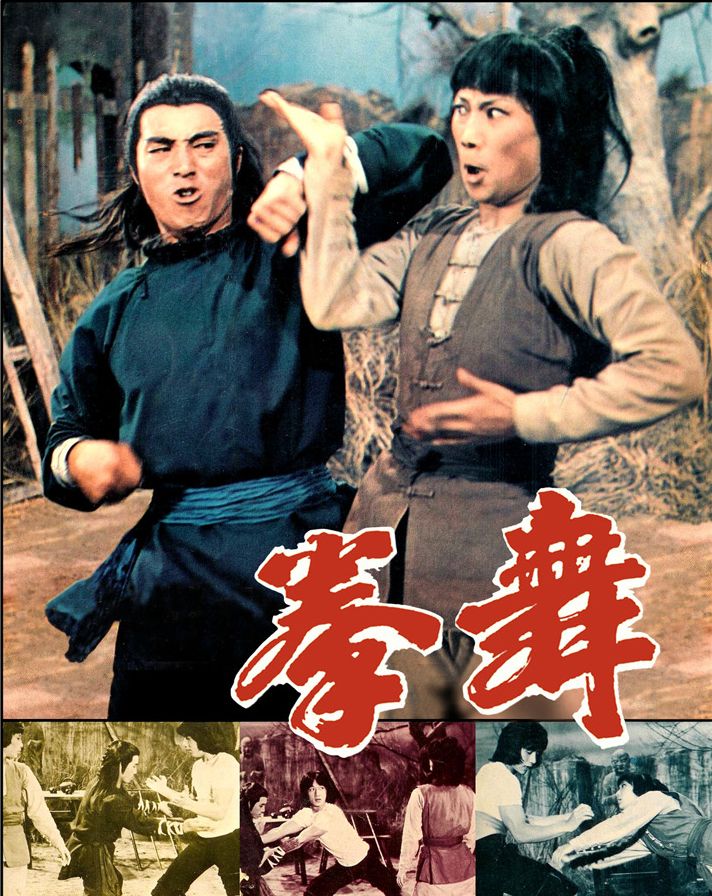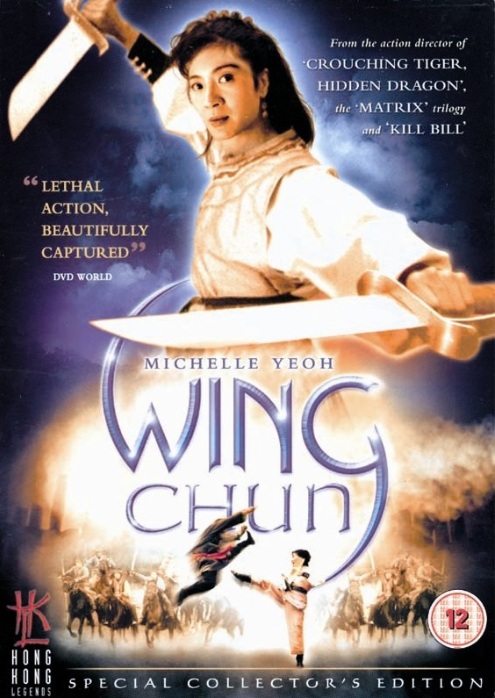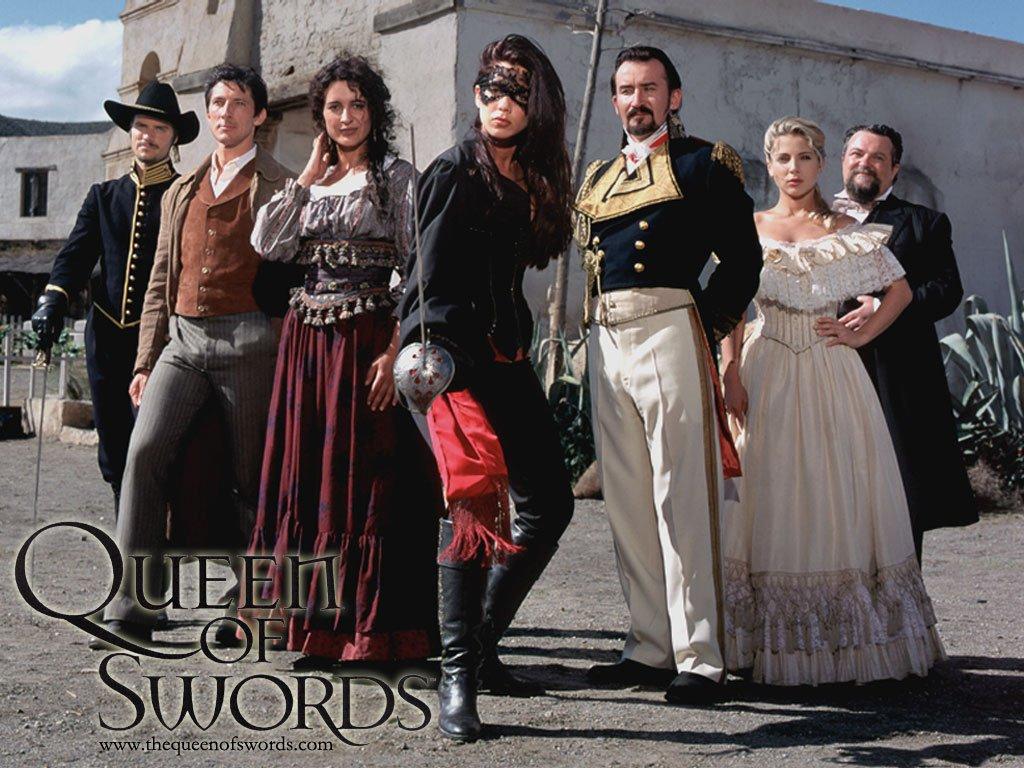 ★★★
★★★
“Leather, whips and lace – gotta love the type.”
In 1817, a young Spanish aristocrat, Tessa Alvarado (Santiago), returns to Spanish California after the death of her father and finds her home in ruins, her father’s manservant reduced to stealing. The town where she was born is run by militaristic governor Colonel Luis Ramirez Montoya (Pelka), who abuses his power, resulting in the miscarriage of justice and the poor living conditions of his subjects. Upset about the state of her birthplace and the murder of her father, Tessa’s path is revealed to her in a mysterious dream where her father comes to her and talks of his murder, his hidden gold, and of his “Avenging Angel”. She will take up arms to protect the people from the town’s governor and to avenge her father’s death. Tessa will do this in disguise behind a mask, becoming that “Avenging Angel”, The Queen of Swords.
Synopsis shamelessly cribbed from Wikipedia, but why re-invent the wheel? That seems to have been the approach taken by the makers here anyway, for their show which ran a single season from October 2000 through June 2001. The obvious, if unacknowledged, inspiration here is Zorro, in which another member of Spanish nobility, adopts a secret identity in order to defend the downtrodden populace from corrupt officials, etc. etc. Indeed, so close were the similarities that Sony sued Fireworks Entertainment, the producers of Queen of Swords, asserting that there was a breach of their rights. The resulting decision was murky: the court initially ruled the character was in the public domain, but later vacated that decision, and the suit was settled out of court, but it’s certainly possible the legal wrangling contributed to the decision to pull the plug on the show, after only eight episodes had aired.
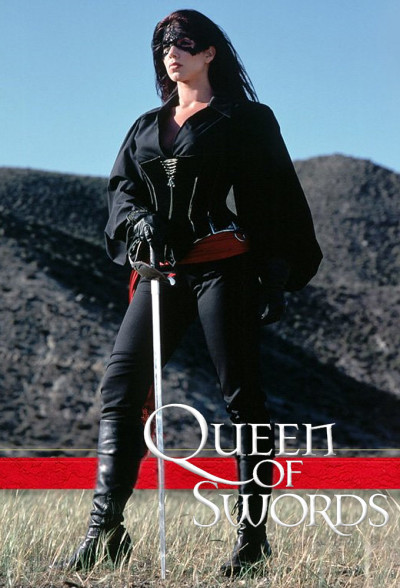 Certainly, in terms of quality, it’s by no means a disaster, and I enjoyed this more than other, recent shows which were yanked as fast, e.g. Killer Women or the Charlie’s Angels reboot. Of course, the central premise requires quite some suspension of disbelief: the concept that putting a little lacy mask on somehow transforms Alvarado and renders her completely unrecognizable by anyone, is nonsense. It’s not as if the town is full of similar-looking women, and she doesn’t even bother to change her voice. Still, if Superman can put on a pair of glasses to the same end, I guess we shouldn’t pick on Queen of Swords. What does work, is the interesting range of characters. Montoya is a bastard, always out for himself, but he’s quite a clever bastard with it, aided by captain of the guard Marcus Grisham (Lemke). On Santiago’s side, she assisted by her gypsy maid – who, like all gypsies, has psychic powers (I think it’s genetic) – and also by the local doctor, Robert Helm (Wingfield), who also has secrets of his own. These are all well-rounded characters whose interaction is fun to watch.
Certainly, in terms of quality, it’s by no means a disaster, and I enjoyed this more than other, recent shows which were yanked as fast, e.g. Killer Women or the Charlie’s Angels reboot. Of course, the central premise requires quite some suspension of disbelief: the concept that putting a little lacy mask on somehow transforms Alvarado and renders her completely unrecognizable by anyone, is nonsense. It’s not as if the town is full of similar-looking women, and she doesn’t even bother to change her voice. Still, if Superman can put on a pair of glasses to the same end, I guess we shouldn’t pick on Queen of Swords. What does work, is the interesting range of characters. Montoya is a bastard, always out for himself, but he’s quite a clever bastard with it, aided by captain of the guard Marcus Grisham (Lemke). On Santiago’s side, she assisted by her gypsy maid – who, like all gypsies, has psychic powers (I think it’s genetic) – and also by the local doctor, Robert Helm (Wingfield), who also has secrets of his own. These are all well-rounded characters whose interaction is fun to watch.
The action work is a bit of a mixed bag. Santiago was found at an open casting call, and underwent two months of training under swordmaster Anthony De Longis, who also plays Tessa’s fencing tutor in the opening episode. However, portraying the character required cobbling together a patchwork of Santiago with stunt doubles and other replacements, including Natalia Guijarro Brasseur, Roberta Brown, Gaëlle Cohen, Mary Gallien, Mary Jose, and even the occasional male for particularly difficult stunts. Again to quote Wikipedia, this “is exemplified in the Queen’s run up the hill away from the soldiers in Death to the Queen. Mary Gallien started the run, Roberta Brown performed the medium shot duel with swords on the hill, Tessie Santiago performed the spoken parts and was in the close-up, and Natalia Brasseur fell off the cliff.” The results are hardly seamless, and fall more into the category of competent than anything else, with the occasional moment that either impresses, or is painfully obvious in the doubling.
The shows did have some decent guest stars. Among the most memorable was perhaps Bo Derek, who played retired pirate captain (!) Mary Rose, who is intent on seeing her son escapes a murder charge. She could, at least, do her own horsework, being quite an accomplished ride. David Carradine also appears, getting to wield a sword some years before doing so in Kill Bill, and Sung-Hi Lee plays another action heroine in a later episode, The Dragon, where she plays a member from a temple of Japanese warrior-priests, whose master (Burt Kwouk – not Japanese either!) is killed, and seeks vengeance on the Queen after being told by Montoya she was behind the attack. Elsa Pataky also has a regular role, playing the wife of a local landowner, who is having an affair with Grisham. Other guests in the series include Simon MacCorkindale and Ralf Moeller. Oddly, given the setting, there’s a high percentage of British actors in both the regular and guest cast, led by Pelka who, despite his accent, was actually born in Yorkshire – his exotic name is Polish, rather than Hispanic…
A few random other thoughts: I grew to despise the theme song, which sounds like a low-rent version of something by the Gypsy Kings. But the lack of over-riding romantic entanglement works in the film’s favour. While there’s a sense Tessa and Dr. Helm have an attraction, unlike certain shows I could mention, the storylines never gets bogged down in this ‘shipper drivel. I reached the end with a feeling of sadness that the show never quite did well enough to merit further season. If far from original, and not even the first female version of Zorro [which would be Zorro’s Black Whip], it was generally entertaining, with performances that were better than I expected. Even now, the legal status of Zorro remains undecided, and until that is resolved, I doubt anyone will head down the distaff version path again. Episode 1 is on YouTube.
Star: Tessie Santiago, Valentine Pelka, Anthony Lemke, Peter Wingfield





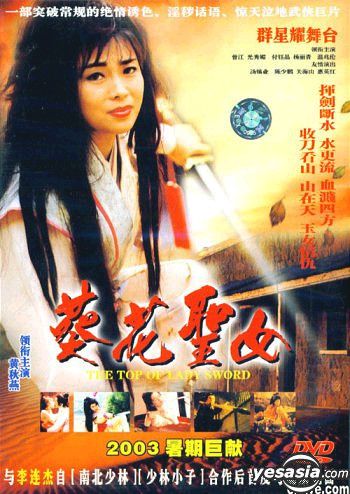


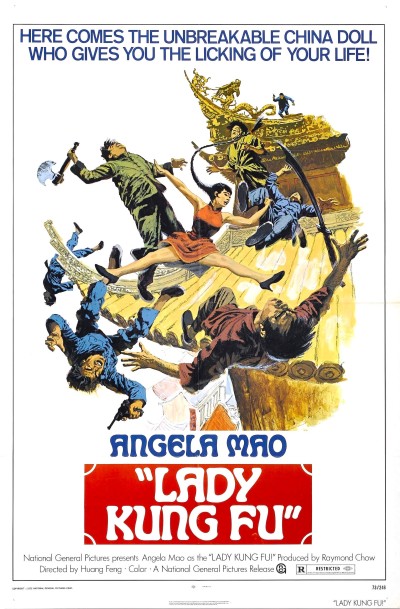
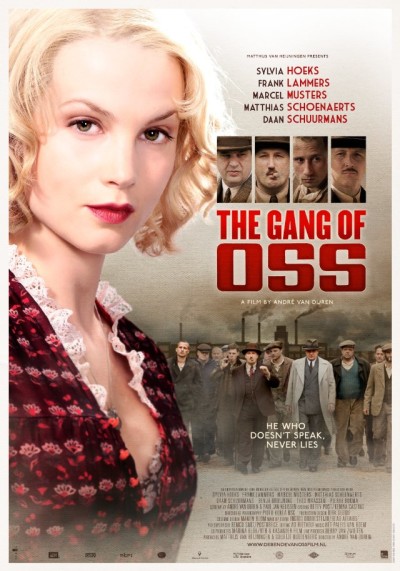 I never really think of the Dutch as the organized crime type, but this film convinces me otherwise, based as it is on actual events from just before World War II. Oss is a town in the Southern half of the Netherlands and, it appears, everyone there is on the take one way or another, from insurance scams to larger scale shenanigans, all the way up to the mayor and the local priest. The federal government has sent military police to the town to keep order, but that only rankles the locals, for the cops are Protestants and they are Catholics. Johanna (Hoeks) hopes to escape a life of crime, planning to open a restaurant when her husband, Ties (Schoenaerts), gets out of jail. But it’s not as easy as it seems. Her spouse is happy to pimp her out, and local boss and Ties’s uncle, Wim de Kuiper (Musters), drags him back into his old ways. When Ties tries to force Johanna to have an abortion, she hatches a plan to have him killed by her lover (and client), Jan, although the plan only puts her deeper in the clutches of de Kuiper. But when she discovers just how low he is prepared to go, she decides he and the rest of his cronies are going down.
I never really think of the Dutch as the organized crime type, but this film convinces me otherwise, based as it is on actual events from just before World War II. Oss is a town in the Southern half of the Netherlands and, it appears, everyone there is on the take one way or another, from insurance scams to larger scale shenanigans, all the way up to the mayor and the local priest. The federal government has sent military police to the town to keep order, but that only rankles the locals, for the cops are Protestants and they are Catholics. Johanna (Hoeks) hopes to escape a life of crime, planning to open a restaurant when her husband, Ties (Schoenaerts), gets out of jail. But it’s not as easy as it seems. Her spouse is happy to pimp her out, and local boss and Ties’s uncle, Wim de Kuiper (Musters), drags him back into his old ways. When Ties tries to force Johanna to have an abortion, she hatches a plan to have him killed by her lover (and client), Jan, although the plan only puts her deeper in the clutches of de Kuiper. But when she discovers just how low he is prepared to go, she decides he and the rest of his cronies are going down.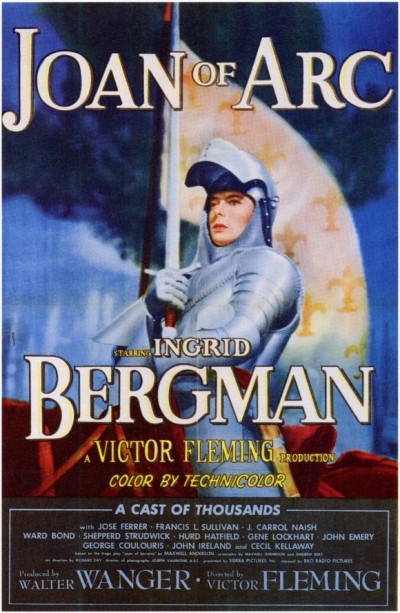 This film’s origins as a stage play are painfully apparent, and you can also see why the distributor’s felt it needed to have 45 minutes cut out before it could be released, as frankly, it’s a bit of a bore. The battle to recapture Orleans is the only action of note here, even though that represented the start of the Maid’s campaign to restore France to its proper ruler (Ferrer), rather than the end. After that, this more or less skips forward to his coronation, then Joan’s capture, spending the rest of the movie – and there’s a lot of it – going through the trial, and the railroading of the heroine into, first throwing herself on the church’s mercy, then recanting her recantation and returning to wearing men’s clothes, thereby sealing her fate. There’s not much here which you won’t have seen before, if you’ve seen any of the other versions of the story, touching the usual bases from Joan’s revelations that she’s going to be the saviour of France, through her trip to see the Dauphin, and so on. It does downplay the “voices” aspect, especially early on, perhaps a wise move since it’s difficult to depict, without making her seem like a religious fruitcake.
This film’s origins as a stage play are painfully apparent, and you can also see why the distributor’s felt it needed to have 45 minutes cut out before it could be released, as frankly, it’s a bit of a bore. The battle to recapture Orleans is the only action of note here, even though that represented the start of the Maid’s campaign to restore France to its proper ruler (Ferrer), rather than the end. After that, this more or less skips forward to his coronation, then Joan’s capture, spending the rest of the movie – and there’s a lot of it – going through the trial, and the railroading of the heroine into, first throwing herself on the church’s mercy, then recanting her recantation and returning to wearing men’s clothes, thereby sealing her fate. There’s not much here which you won’t have seen before, if you’ve seen any of the other versions of the story, touching the usual bases from Joan’s revelations that she’s going to be the saviour of France, through her trip to see the Dauphin, and so on. It does downplay the “voices” aspect, especially early on, perhaps a wise move since it’s difficult to depict, without making her seem like a religious fruitcake.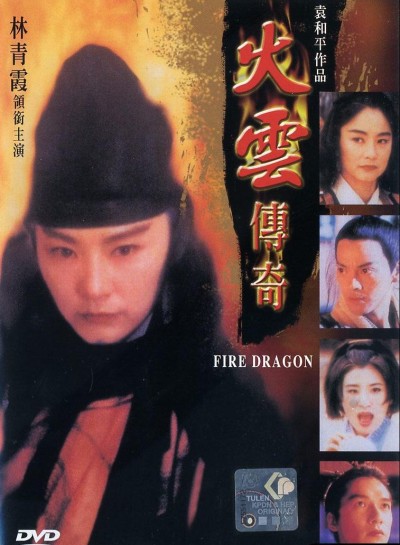 Prince Six (Tan) is plotting rebellion against the legitimate government, but Ming (Chu) has obtained a piece of compromising evidence from a dying Imperial guard. Before he can deliver it, the seal proving his identity is lifted by Tang Lyn-Yu (Ng), who runs a circus troupe, but has set her amorous eyes on Mind. He returns to the troupe, to try and locate the seal, but also there, undercover, is Fire Devil (Lin), who has been tasked by Six with locating and destroying the evidence of his treachery. However, after her involvement in a battle which leaves a young child orphaned, along with her beginning to fall for Ming, she begins to question whether she is on the right side of the fight. It doesn’t count as much of a spoiler to say that it ends with Fire Devil taking on Six, in a finale which involves so many things blowing up, you’d be forgiven for thinking the title of the film was as given at the top.
Prince Six (Tan) is plotting rebellion against the legitimate government, but Ming (Chu) has obtained a piece of compromising evidence from a dying Imperial guard. Before he can deliver it, the seal proving his identity is lifted by Tang Lyn-Yu (Ng), who runs a circus troupe, but has set her amorous eyes on Mind. He returns to the troupe, to try and locate the seal, but also there, undercover, is Fire Devil (Lin), who has been tasked by Six with locating and destroying the evidence of his treachery. However, after her involvement in a battle which leaves a young child orphaned, along with her beginning to fall for Ming, she begins to question whether she is on the right side of the fight. It doesn’t count as much of a spoiler to say that it ends with Fire Devil taking on Six, in a finale which involves so many things blowing up, you’d be forgiven for thinking the title of the film was as given at the top.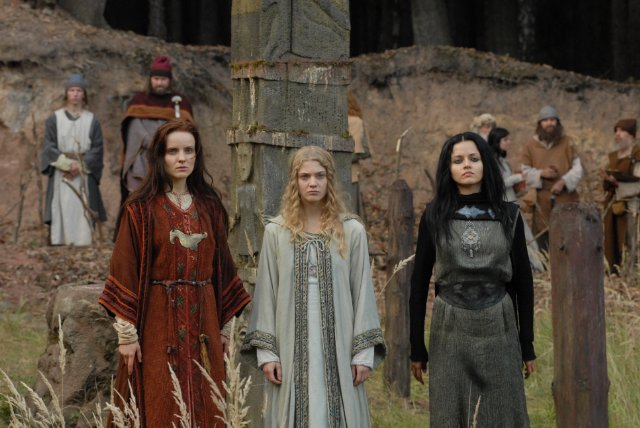 ★½
★½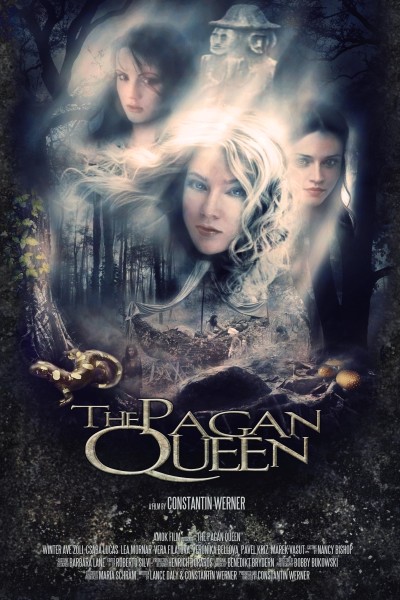 It really is nowhere near as good as this sounds, and the synopsis above is significantly more coherent. I swear, I didn’t fall asleep – but it felt like I did, the story lurching from scene to scene in a disjointed manner that rapidly drained all interest. Outside of the heroine, there was hardly any significant effort at giving the characters motivation or depth, and matters weren’t helped by the fact the entire nation seemed to consist of about 25 people. The scenery is nice, and the soundtrack has a full, orchestral feel which seems to have escaped from a higher-budget movie, but it doesn’t work as a historical piece or as a political one – and, certainly, not as an action film. However, I was amused by what I suspect is likely a realistic, if ruthless, depiction of what would probably happen when a warrior maiden comes up against her male counterpart.
It really is nowhere near as good as this sounds, and the synopsis above is significantly more coherent. I swear, I didn’t fall asleep – but it felt like I did, the story lurching from scene to scene in a disjointed manner that rapidly drained all interest. Outside of the heroine, there was hardly any significant effort at giving the characters motivation or depth, and matters weren’t helped by the fact the entire nation seemed to consist of about 25 people. The scenery is nice, and the soundtrack has a full, orchestral feel which seems to have escaped from a higher-budget movie, but it doesn’t work as a historical piece or as a political one – and, certainly, not as an action film. However, I was amused by what I suspect is likely a realistic, if ruthless, depiction of what would probably happen when a warrior maiden comes up against her male counterpart.